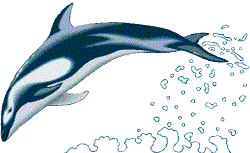

SHORT TERM GOALS:
(1) To help students become familiar with aspects of Greek and Roman mythology that
concern the oceans and humankind's relationship with them.
(2) To provide students with an opportunity to use various sources of information (i.e.
books, Internet) to locate and to learn about the mythological and mysterious aspects
of the oceans.
TIME ALLOTMENT: 3 1/2 hours
CONTENT AREAS ADDRESSED:
(1) Language Arts
(2) Social Studies
(3) Art
(4) Computer usage
CONCEPTS ADDRESSED:
(1) Greek and Roman mythology
(2) Research methods
(3) Cooperative learning
(4) Public speaking
MATERIALS:
(1) Computers with Internet access
(2) Reference books about mythology
(3) Paper (colored construction and loose-leaf)
(4) Markers, crayons, colored pencils
(5) Scissors, glue
(6) Overhead projector, blank transparencies, and washable markers
PROCEDURE:
(1) Students are placed in groups of three or four (depending upon class size). Once this
is accomplished, each group should explore specific web pages and books that
contain information about oceanic myth. The addresses for the web pages are as
follows:
http://www.math.utk.edu/~vasili/GR_link/Greek_myth
http://www.eliki.com/ancient/myth/
http://web.uvic.ca/grs/bowman/myth/index.html
(2) Students should search web sites/books and look for any information about gods,
goddesses, or myths that deal with oceans or other bodies of water. Each group
should decide what god, goddess, or myth they would like to research and then
inform the teacher so he or she can approve of the choice.
(3) Once each group has selected their mini-research topic, they should decide who is
going to do what job within the group. One student should be the recorder (i.e. the
person who writes down notes about their topic), the "go-for" (i.e. the person
who gets paper, markers, etc.), the presenter (i.e. the person who presents the
information to the class), and the "whip" (i.e. the person who keeps everybody
focused on the project). However, each person is expected to help others carry-out
their roles. For groups of three, each student should act as "whip," and for each
group, there may be more than one presenter.
(4) After group roles have been assigned, each group must create a mini-research project
about their chosen topic. The report should consist of: a 2-3 minute oral report that
details who the main character is (are) and what he or she (they) did, a drawing of the
figure or event, and an explanation of how this topic is relevant to us today (i.e. How
do we see aspects of this topic in today's society, language, literature, etc.?).
(5) When all groups are finished with their mini-research project, each group should have
its presenter(s) share with the class what the group discovered.
(6) After each presentation students may hang their projects on a bulletin board labeled
"A Mythological Look into the Oceans."
(7) Ask students who they think were the major gods or goddesses of the oceans and
seas. As the ideas are brought forth, specifically highlight Poseidon, Neptune, and
Oceanus. Ask the students if they know anything about any of them and ask them to
tell what they know. Then, discuss who each god/Titan was and what his function
was within the ancient world. End the discussion with a brief explanation about the
roles ocean gods and goddesses play in The Odyssey.
ASSESSMENT:
(1) Group Participation Rubric
(2) Writing Rubric
EXTENSIONS:
(1) Bring in a guest speaker that is knowledgeable about this topic (i.e. a college
professor, an author, etc.) and ask him or her to share his or her knowledge with the
students.
(2) As an alternative to the writing project and the group presentation, allow students to
create and to present a 5-10 minute skit that addresses all of the questions in
Procedure #4.
(3) Using the gods within the myths they researched, allow students to write their own
myths about something they find interesting (i.e. the origin of their favorite sport, a
certain natural phenomenon, etc.).
REFERENCE LIST:
Asimov, I. (1961). Words from the myths. New York: New American Library. [ISBN: 0-451-14097-4]
Bulfinch, T. (1959). Bulfinch's mythology. New York: Laurel. [ISBN: 0-440-30845-3]
Gibson, M. (1991). Gods, men & monsters from the greek myths. New York: Peter Bedrick Books. [ISBN: 0-87226-911-6]
Hamilton, E. (1940). Mythology. New York: New American Library. [ISBN: unavailable]
Go to: